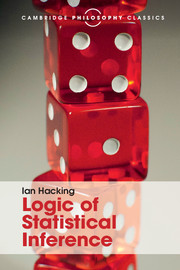Book contents
5 - The law of likelihood
Published online by Cambridge University Press: 05 July 2016
Summary
The unique case rule tries to state a connexion between frequency and support. In extending the idea it is useful to begin with a piece of reasoning based upon frequencies, but which the rule cannot validate. Imagine a textual critic editing a fragment from a Ciceronian manuscript. He knows the fragment is thirteenth century, but not whether it is faithful to its original. He must guess whether it comes from a reliable source or not. He notes a solecism of the sort seldom found in a classical author, but which all too often creeps in on the hand of a medieval copyist. On this slender data, he guesses his fragment is not to be trusted. Perhaps the inference can be schematized:
(1) every X is either Y or Z—every fragment that includes a solecism is either unreliable or reliable;
(2) the long run frequency of X’s among Y's is greater than that among Z's; therefore, lacking other information,
(3) the guess that this X is Y is better supported than the guess that this X is Z.
In contrast, the unique case rule validates inferences of the following sort:
(1) every X is either Y or Z;
(2) the long run frequency of Y's among X's is greater than that of Z's among X's; therefore, lacking other information,
(3) the guess that this X is Y is better supported than the guess that this X is Z.
Only the second premiss differs, but when schematized as above, it is plain that the inferences do differ. Yet the contrast need not be too great. We must not be entirely blinded by the beauties of logical form.
I shall argue that both inferences are validated by exactly the same fact about frequency and support. Perhaps it has never been denied that the unique case rule and the critic's guess have the same foundation, but I am sure most students assume the two are rather different. It is commonly believed that the rule is justified by long run success, but with the other sort of inference, most sober minds have balked at inventing a ‘long run’ of chance set-ups among which a man might be successful. So it has generally been supposed that the rule rests on different principles than the critic's guess.
- Type
- Chapter
- Information
- Logic of Statistical Inference , pp. 48 - 66Publisher: Cambridge University PressPrint publication year: 2016



